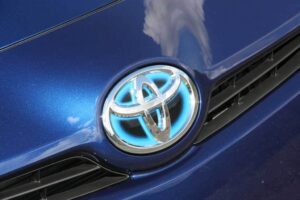Toyota Motor Corp. will take a nearly 5% stake in Japanese rival Suzuki Motor Corp., while the two companies have also agreed to work together on the development of autonomous vehicle technology.
The move is the latest by Toyota, a company that historically preferred to go it alone, to team up with an erstwhile rival. In recent years, it has either purchased outright or added a stake in Japanese competitors Daihatsu, Hino, Subaru, Yamaha and Mazda.
The latest deal reflects the fact that “The automobile sector is currently experiencing a turning point unprecedented in both scope and scale,” Toyota and Suzuki said in a joint statement.
As part of the new agreement, Toyota will acquire a 4.94% stake in Suzuki for 96 billion yen, or $910 million. In turn, the smaller automaker will purchase 0.2% of Toyota’s outstanding shares for 48 billion yen, or about $455 million.
Suzuki is a pint-sized player compared to its new partner, with global sales of just 3.224 million in 2018. Toyota, by comparison, sold 10.567 million vehicles – a figure that included about 1.682 million badged under the now wholly owned Daihatsu and Hino brands.
Suzuki does bring some significant strengths to the table. It is a strong player in the mini and microcar segments and it is a dominant player in the emerging Indian market that generated 55.2% of its overall volume last year.
Nonetheless, in an industry where economies of scale have become a critical goal, the partnership with Toyota could become pivotal in bringing down costs, such as parts purchasing. And by teaming up on the development of self-driving vehicles, both automakers can defray some of their investments.
In their joint statement, the automakers said their new alliance is aimed at “building and deepening cooperative relationships in new fields while continuing to be competitors.”
Toyota was a relatively slow entrant into the field of autonomous driving but has accelerated its push during the last several years. But, even as one of the world’s most profitable carmakers, the investment needed to bring self-driving vehicles to market will stretch its budget.
While the company was a pioneer in electrification with its Prius hybrid, it was also slow to embrace more advanced battery-car technologies, including all-electric vehicles. It has opened up to rivals its patents for electric motors and power control units, hoping that by expanding demand it will also drive down costs.
For Suzuki, the strain of staying on top of tomorrow’s technological developments is even more challenging, considering its focus on small, relatively low-priced vehicles.
The equity swap marks the latest move in an expanding relationship between Toyota and Suzuki. Two years ago, they agreed to work together to help Toyota build a bigger presence in India, where it is a relatively small player.
Alliances are becoming the norm, rather than the exception, in the auto industry. Among Japanese automakers, Nissan maintains one of the longest of such partnerships with its Renault-Nissan Alliance formed in 1999. It added Mitsubishi to the mix several years ago. Honda, meanwhile, has a series of deals in place with General Motors, one focusing on hydrogen fuel cells, the other on autonomous driving.
(For more on Honda’s autonomous driving deal with General Motors, Click Here.)

